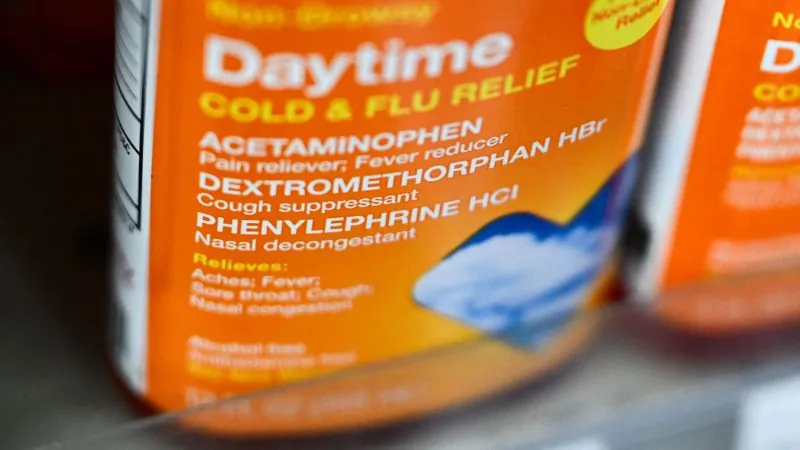
FDA's Bold Move: Could Popular Decongestant Phenylephrine Soon Disappear from Store Shelves?
2024-11-08
Author: Ying
FDA's Proposal to ban Oral Phenylephrine
The U.S. Food and Drug Administration (FDA) has made headlines with its recent proposal to potentially ban oral phenylephrine, a prevalent ingredient found in numerous over-the-counter (OTC) decongestants. This decision comes after growing evidence raised serious concerns about the drug's effectiveness.
Reliance on Phenylephrine
Phenylephrine is a staple in products such as Sudafed PE, Vicks DayQuil, and Mucinex Sinus-Max, which have been trusted by consumers for decades. However, as part of the proposal, a six-month public comment period has been initiated, giving both consumers and health professionals a chance to weigh in before a final decision is made.
Market Response to the Proposal
Notably, CVS took proactive measures last year to remove phenylephrine products from its shelves following an FDA advisory committee’s conclusion highlighting its inefficacy. Major pharmacy chains like Walgreens and Rite Aid continue to offer phenylephrine-containing products for now, but a shift may be on the horizon.
History and Rise of Phenylephrine
While phenylephrine was originally approved for OTC use in the 1970s, its popularity soared in 2005, coinciding with heightened restrictions on pseudoephedrine, a powerful decongestant that can be misused to produce methamphetamine. This move forced consumers to seek alternative options, paving the way for phenylephrine's rise.
Effectiveness Under Scrutiny
Safety concerns surrounding phenylephrine have never been paramount; rather, its effectiveness has been under scrutiny for years. A pivotal FDA advisory panel in 2007 entertained the notion that phenylephrine "may be effective" but strongly recommended further research. More recent studies, however, have consistently demonstrated that oral phenylephrine is ineffective at the standard dosages prescribed.
Recent Developments and Implications
The urgency of the matter became evident in September 2023, when another FDA advisory committee confirmed the overwhelming evidence against the effectiveness of oral phenylephrine. If the agency ultimately enforces a ban on this ingredient, manufacturers will have time to either rework their formulations or withdraw products from stores.
Impact on Nasal Spray
Interestingly, while phenylephrine also finds use in nasal spray formulations for congestion relief, the FDA's proposal specifically targets only the oral variations of the drug.
Reactions from Stakeholders
The Consumer Healthcare Products Association, representing OTC medicine manufacturers, expressed disappointment at the FDA's proposal. They assert that the data available since the previous review in 2007 fails to justify any adjustments to its safety and effectiveness status. In a statement, the association emphasized, “Consumers need options for self-care,” highlighting that the presence of oral phenylephrine provides a valuable, accessible choice for many Americans.
Conclusion and Next Steps
With the future of phenylephrine hanging in the balance, stakeholders are waiting with bated breath. Will the FDA’s decision reshape the decongestant landscape in pharmacies across the nation? Only time will tell, but consumers are encouraged to voice their opinions during this critical public comment period. Stay tuned for updates on this unfolding story that could impact cold and allergy sufferers everywhere!




 Brasil (PT)
Brasil (PT)
 Canada (EN)
Canada (EN)
 Chile (ES)
Chile (ES)
 España (ES)
España (ES)
 France (FR)
France (FR)
 Hong Kong (EN)
Hong Kong (EN)
 Italia (IT)
Italia (IT)
 日本 (JA)
日本 (JA)
 Magyarország (HU)
Magyarország (HU)
 Norge (NO)
Norge (NO)
 Polska (PL)
Polska (PL)
 Schweiz (DE)
Schweiz (DE)
 Singapore (EN)
Singapore (EN)
 Sverige (SV)
Sverige (SV)
 Suomi (FI)
Suomi (FI)
 Türkiye (TR)
Türkiye (TR)